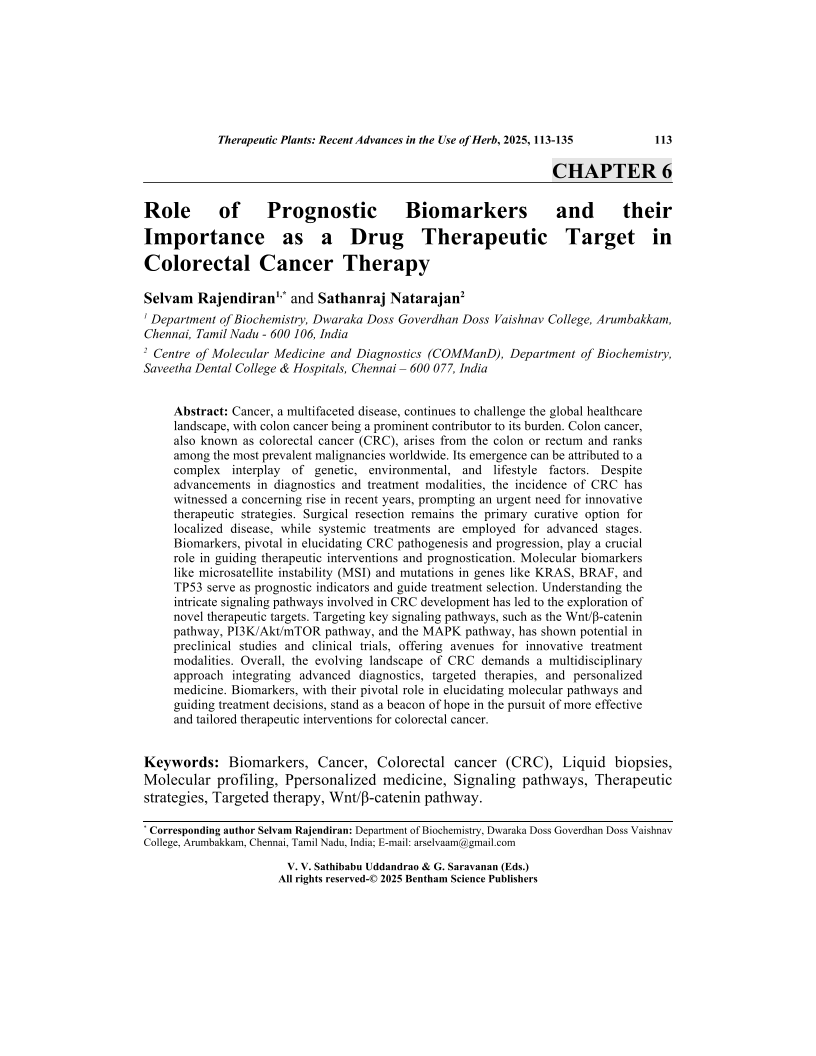Role of Prognostic Biomarkers and their Importance as a Drug Therapeutic Target in Colorectal Cancer Therapy

- Authors: Selvam Rajendiran1, Sathanraj Natarajan2
-
View Affiliations Hide Affiliations1 Department of Biochemistry, Dwaraka Doss Goverdhan Doss Vaishnav College, Arumbakkam, Chennai, Tamil Nadu 600 106, India 2 Centre of Molecular Medicine and Diagnostics (COMManD), Department of Biochemistry, Saveetha Dental College & Hospitals, Chennai 600 077, India
- Source: Therapeutic Plants: Recent Advances in the Use of Herbs as Alternative Medications , pp 113-135
- Publication Date: May 2025
- Language: English
Role of Prognostic Biomarkers and their Importance as a Drug Therapeutic Target in Colorectal Cancer Therapy, Page 1 of 1
< Previous page | Next page > /docserver/preview/fulltext/9789815322910/chapter-6-1.gif
Cancer, a multifaceted disease, continues to challenge the global healthcare landscape, with colon cancer being a prominent contributor to its burden. Colon cancer, also known as colorectal cancer (CRC), arises from the colon or rectum and ranks among the most prevalent malignancies worldwide. Its emergence can be attributed to a complex interplay of genetic, environmental, and lifestyle factors. Despite advancements in diagnostics and treatment modalities, the incidence of CRC has witnessed a concerning rise in recent years, prompting an urgent need for innovative therapeutic strategies. Surgical resection remains the primary curative option for localized disease, while systemic treatments are employed for advanced stages. Biomarkers, pivotal in elucidating CRC pathogenesis and progression, play a crucial role in guiding therapeutic interventions and prognostication. Molecular biomarkers like microsatellite instability (MSI) and mutations in genes like KRAS, BRAF, and TP53 serve as prognostic indicators and guide treatment selection. Understanding the intricate signaling pathways involved in CRC development has led to the exploration of novel therapeutic targets. Targeting key signaling pathways, such as the Wnt/β-catenin pathway, PI3K/Akt/mTOR pathway, and the MAPK pathway, has shown potential in preclinical studies and clinical trials, offering avenues for innovative treatment modalities. Overall, the evolving landscape of CRC demands a multidisciplinary approach integrating advanced diagnostics, targeted therapies, and personalized medicine. Biomarkers, with their pivotal role in elucidating molecular pathways and guiding treatment decisions, stand as a beacon of hope in the pursuit of more effective and tailored therapeutic interventions for colorectal cancer.
-
From This Site
/content/books/9789815322910.chapter-6dcterms_subject,pub_keyword-contentType:Journal -contentType:Figure -contentType:Table -contentType:SupplementaryData105

